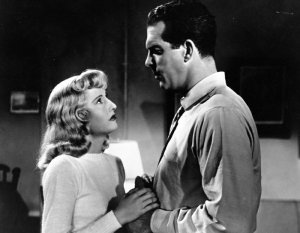Raymond Chandler’s classic discussion of the noir genre, “The Simple Art of Murder,” includes the famous line
But down these mean streets a man must go who is not himself mean, who is neither tarnished nor afraid.
The detective in this kind of story, Chandler says (thinking of Dashiell Hammett’s Marlowe) must be such a man. And the point of the story is not so much solving the murder as seeing how the character of the hero unfolds. His redemption is what makes the story work, what makes it art, as opposed to schlock.
Chandler was writing within a schlock genre, but he aimed to create art. “To exceed the limits of a formula without destroying it,” he said, “is the dream of every magazine writer who is not a hopeless hack.”
When Billy Wilder brought him in to write the screenplay of James M. Cain’s novella, Double Indemnity, Chandler got his chance.  Cain’s hero, Walter (Fred MacMurray), is a smart guy whose talents are wasted in his job as an insurance salesman. He isn’t really played by Phyllis (Barbara Stanwyck), the lonely wife of a wealthy man who wants to cash in on her husband’s accident insurance policy. He plays himself: the murder is a challenge, a high-stakes game that’s more of a turn-on than Phyllis.
Cain’s hero, Walter (Fred MacMurray), is a smart guy whose talents are wasted in his job as an insurance salesman. He isn’t really played by Phyllis (Barbara Stanwyck), the lonely wife of a wealthy man who wants to cash in on her husband’s accident insurance policy. He plays himself: the murder is a challenge, a high-stakes game that’s more of a turn-on than Phyllis.
When I met Phyllis I met my plant. If that seems funny to you, that I would kill a man just to pick a stack of chips, it might not seem so funny if you were back at that wheel, instead of out front.
Chandler took this motivation, but he made it more explicit by having Walter narrate the story of his crime to his boss, Barton Keyes (Edward G. Robinson). Walter was attracted to Phyllis from the get-go; he saw her standing at the top of the staircase, wearing nothing but a towel. “I wanted to see her again. Close, and without that silly staircase between us.”
But he went into the relationship — and the crime — with his eyes open. What makes him nervous isn’t the fear of getting caught. He thinks he has that little wrinkle figured out. All he has to do is to murder Phyllis, and pin the murder on the young man he believes she’s two-timing him with, the boyfriend of Phyllis’s step-daughter, Lola. His boss, Keyes, already suspects the two of them. Piece of cake.
Then Walter surprises us. He realizes the boyfriend is not in cahoots with Phyllis and sends him back to Lola, takes the rap after all. WHY?
It’s about redemption, Watson. Chandler told us that. He confesses the whole sordid tale to Keyes, and Keyes forgives him. Yeah, he’s going down. He doesn’t care, so long as Lola knows the truth. And as long as Keyes understands.


A wonderful movie. You’ve sketched its complexities well.
LikeLike
Thanks, John. I’m still thinking about this one. And if you don’t know Chandler’s essay, you ought to take a look: http://www.en.utexas.edu/amlit/amlitprivate/scans/chandlerart.html
LikeLike